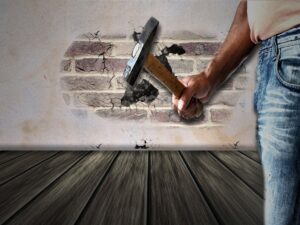Test Radon Levels Before Your Basement Renovation

With the colder weather outside, many homeowners plan winter and early spring renovations to capitalize on downtime, enhance their enjoyment of their home, and improve the property’s value if they are preparing to sell in the new year. If you are similarly planning on breaking ground and renovating your basement in the coming years, consider the importance of testing radon levels.
Radon Gas & Your Basement
Radon gas is one of the biggest safety issues in both new and old basements. This odorless, tasteless, and colorless heavy gas naturally rises from the ground underneath structures and will permeate and settle in basements and similar crawlspaces. Radon’s high decay rate makes the gas particularly dangerous to humans and is currently listed as the second leading cause of lung cancer after smoking.
Getting Your Basement Tested Before Renovation Work Begins
Getting a property’s radon levels tested is easy. Simply head to your local hardware store and purchase a home radon test or contact an experienced radon mitigation contractor like Radon-Rid, LLC to test your home. With store-bought test kits, you will have to mail a sample of your home’s air to a local company who will provide you with an answer in a few short weeks. In contrast, an in-home professional can immediately tell you your radon gas levels.
If your home test results show that your basement radon levels are at a ‘safe level’ then you are all set to get your basement renovation underway! However, if your results show high levels of radon gas or levels close to the unsafe amount, then you should consider immediately contacting your local radon mitigation contractor to get started on the necessary steps to remove and reduce radon gas levels.
A few of the common tasks our team at Radon-Rid, LLC will recommend for homeowners include:
- Sealing all cracks in the basement and crawlspace floors and walls with a radon grade sealant.
- Installing an appropriate exhaust fan and pipe in the basement to routinely vent out air and prevent radon gas from settling inside at high levels.
- If we determine that other areas of your home are susceptible to radon gas accumulation, we may also recommend a full house ventilation system.
Remember, radon levels can differ greatly from home-to-home. So even if your neighbor received safe rating results, your home could contain unsafe levels of the gas.
Protect Your Health: Have Radon-Rid, LLC Test Your Radon Levels Today
Exposure to radon gas kills an average of 21,000 Americans every year. Yet, the threat can be easily diagnosed and readily mitigated. Ensure your home and family are safe by contacting Radon-Rid, LLC today to learn more about testing your radon levels and radon gas remediation services.
Related Posts
Why Are More People Testing for Radon in 2020?
Why Should I Hire a Professional Radon Testing and Remediation Company?
Is Radon Testing Necessary When Buying A Home?
We Want to Help
"(required)" indicates required fields
Categories
- Blog (48)
- Environmental Pollution (2)
- Family Health (9)
- In the News (10)
- Lung Cancer (5)
- Radon Remediation (10)
- Radon Testing (24)
Radon – The Silent Killer
Radon In Your Home
- Learn More About Radon Levels in Your County
- Take a few minutes to browse our Get To Know Radon Online Presentation.
- When you are finished, be sure to tell a loved one about our testing programs offered in Berks, Chester, Delaware, Lancaster, Montgomery & Philadelphia Counties.